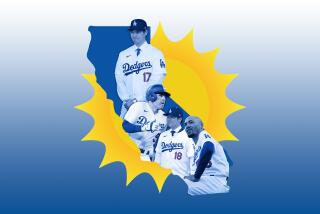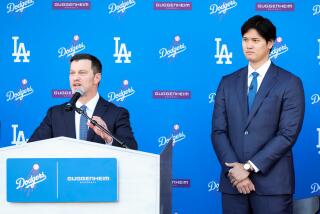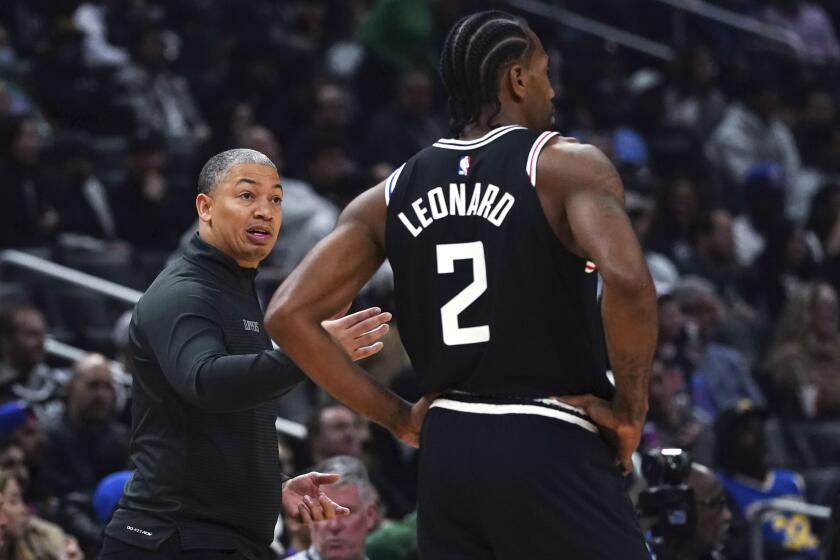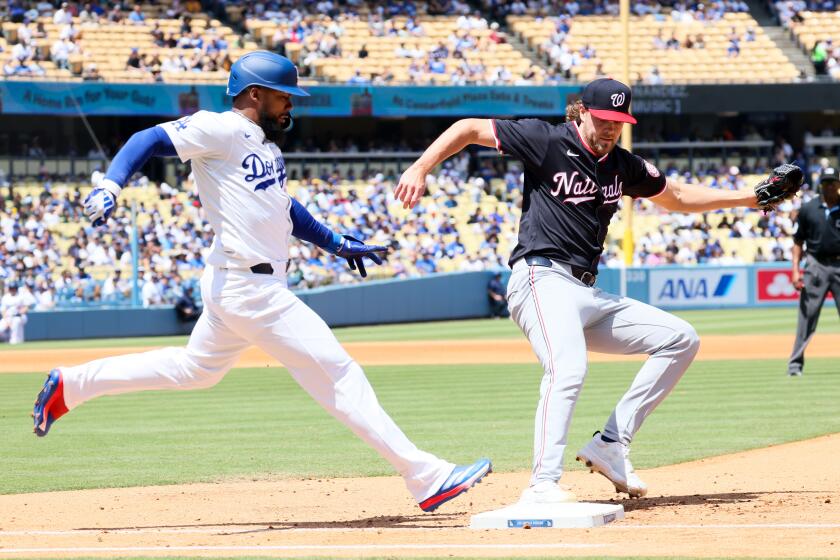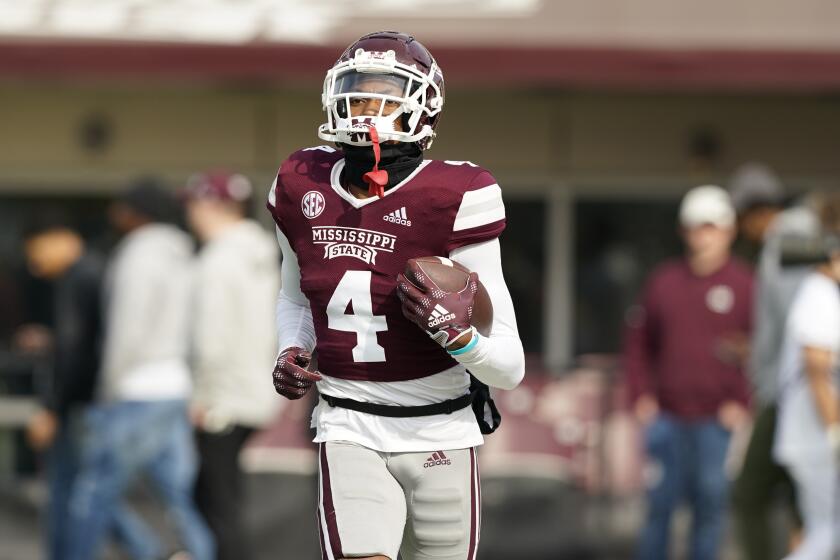Column: Dodgers fans finally show up at the polls to push Justin Turner to lead in All-Star voting
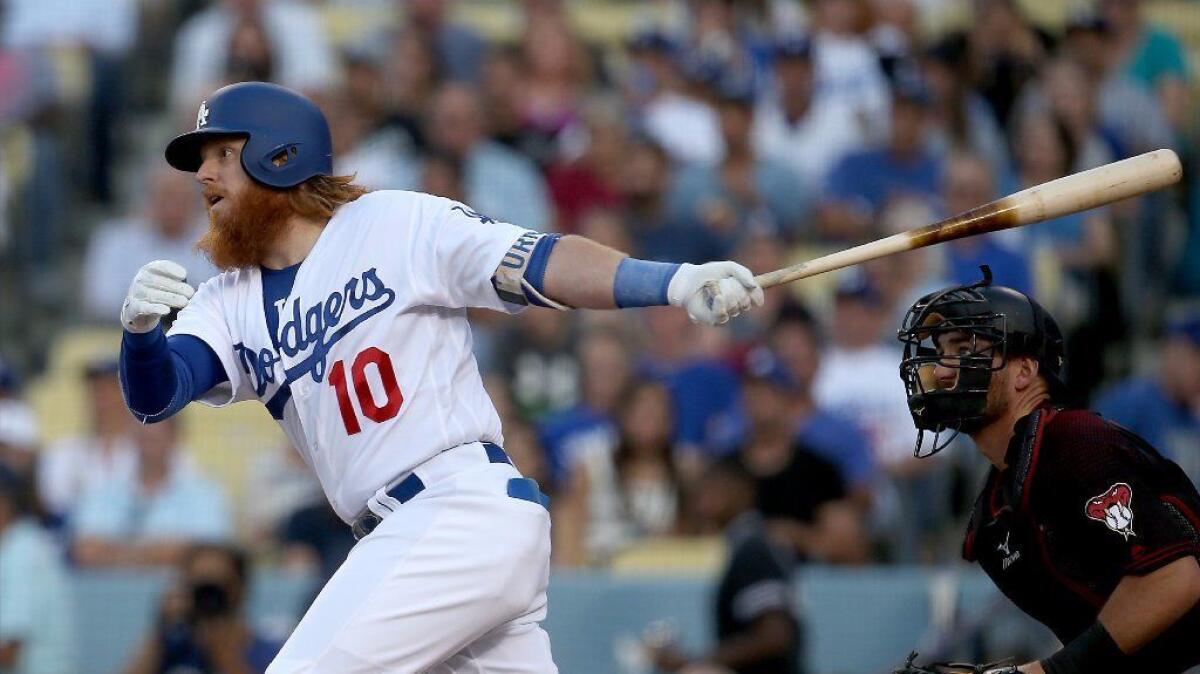
Who knew? The voters were here. They just had to be nudged — or, in this particular case, insulted by the team’s closer.
Justin Turner is now on the verge of being on his first All-Star team. With a day remaining in the Final Vote, the ginger-bearded Dodgers third baseman was leading the online poll to determine the last spot on the National League roster. The competition ends Thursday at 1 p.m.
Of course, it shouldn’t have come to this.
In a market the size of Los Angeles, Turner should have been voted in as a starter. With the support of a passionate fan base, there’s no reason Turner should be waiting to finalize his plans for next week.
Yes, this is another column about the Dodgers’ region-wide television blackout. The Dodgers would argue my colleagues and I are taking turns beating a dead horse in these pages, but the reality is inescapable.
Turner’s potential election is only the latest example of the damage inflicted by the Dodgers’ lucrative but ultimately short-sighted television deal.
If the fans’ spirited backing of Turner is evidence of Los Angeles’ potential as a baseball town — “Overwhelming,” was how Turner described the support — his place on the Final Vote ballot is a cruel reminder of how that promise remains an abstraction because a majority of the market can’t watch the Dodgers regularly.
It’s true the Dodgers had trouble placing their players in All-Star starting lineups before they entered their current TV agreement. The Dodgers didn’t have a single elected starter from 1998 to 2004. Only six times since then have they had a player voted into the NL lineup — and twice it was Matt Kemp.
But the Lakers teams of Shaquille O’Neal and Kobe Bryant fundamentally changed Los Angeles as a market. They were the right team at the right time, their triumphs coinciding with developments in technology and media that made them ubiquitous. People who previously had a casual interest in basketball used to pack bars to watch regular-season games. Angelenos weren’t only watching sports, they were watching them intensely.
The recent decline of the Lakers presented the Dodgers with an opportunity to expand their circle of diehard fans. Except it’s hard to strengthen bonds with your fans if your fans can’t watch you every night, as has been the case for the last 3½ seasons. So even as the Dodgers improved their on-field product under the ownership of Guggenheim Baseball Management, the voting patterns of their fans stagnated, if not worsened.
Which brings us to the present, where an affable Dodger such as Turner can’t be voted into the starting lineup even with a batting average of close to .400.
Ironically, it was a poorly thought-out sentiment by closer Kenley Jansen that energized Turner’s Final Vote campaign. Jansen blamed the fans for Turner and Corey Seager’s absence from the NL lineup, as if it’s the responsibility of fans to care about the Dodgers and not the responsibility of the Dodgers to make the fans care about them.
But Dodgers fans can be curiously sensitive. Don’t believe me? Make a crack about Dodger Dogs or early-departing fans and see how they react.
They will react with the same pride they did to the slight by Jansen, accounting for a significant share of the 12.9 million votes Turner has received in the Final Vote. By comparison, the top vote getter in the American League, Mike Moustakas of the Kansas City Royals, has received 8.5 million votes.
Dodgers manager Dave Roberts, who also experienced this market as a player, theorized Jansen was able to connect with the team’s fans.
“When you get comments made to the fan, I think for a fan, there’s a connection that you feel, ‘I want to respond,’ ” Roberts said.
It shouldn’t take a misguided statement from a well-intentioned player to build that bridge to an audience. Here’s something else that could: A three- or four-hour commercial on television every night.
You know, the game.
Follow Dylan Hernandez on Twitter @dylanohernandez
More to Read
Get our high school sports newsletter
Prep Rally is devoted to the SoCal high school sports experience, bringing you scores, stories and a behind-the-scenes look at what makes prep sports so popular.
You may occasionally receive promotional content from the Los Angeles Times.

